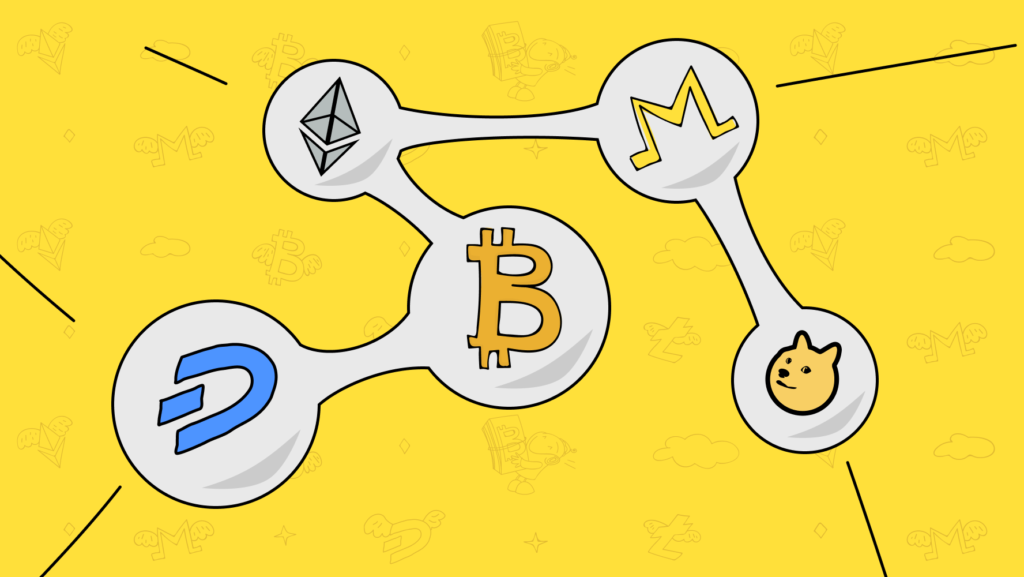
Every person on the planet has heard about cryptocurrencies in recent years.
With the growing popularity of cryptocurrencies comes an increased interest in other digital financial transactions.
But, if you want to buy or sell cryptocurrencies, you will need a exchange.
A decentralized exchange, or DEX, is a peer-to-peer marketplace where cryptocurrency traders may conduct transactions without entrusting their assets to an intermediary or custodian.
To understand decentralized exchanges, first you should familiarize yourself with centralized exchanges.
A centralized exchange is a platform where anyone may buy, sell, or trade cryptocurrencies that are listed on that exchange.
Assume you wish to acquire some Bitcoin.
You may visit an exchange, join up by supplying banking and identification information, and deposit some cash.
The exchange will tell you the price based on a “order book” of individuals buying and selling at various quantities, and you can then complete the transaction.
So, what comes next?
The exchange will display those Bitcoins in your account, and you may trade them for other tokens. But you do not truly own them since you are relying on the exchange to serve as a custodian on your behalf.
Any trade you perform, like as exchanging Bitcoin for Ethereum, takes place within the exchange’s database rather than on a blockchain.
The user’s coins are pooled into exchange-controlled wallets.
The exchange is in charge of your private keys
DEX supporters argue that the attractiveness of decentralized exchanges is security.
A centralized exchange can restrict your access to your cryptocurrency, limit or prevent your ability to trade it, and potentially leave you susceptible to hackers.
Centralized exchanges, on the other hand, are often considerably easier to use for newbies, and they may sometimes offer quick trading since they are not bound by blockchain technology.
How do DEXs work?
DEXs are constructed on top of blockchain networks and employ smart contracts to enable trade between individuals while retaining ownership of their currency.
Along with the trading cost, each deal incurs a processing fee.
Decentralized exchanges are classified into three types:
- Automated market makers
- Order books DEXs
- DEX aggregators
Automated market makers (AMMs):
AMMs rely on blockchain-based services called blockchain oracles, which supply information from exchanges and other platforms to fix the price of traded assets.
Instead of matching buy and sell orders, these DEX’s smart contracts employ pre-funded asset pools known as liquidity pools.
Other users finance the pools, and they are then entitled to the transaction fees levied by the protocol for executing transactions on that pair.
To earn income on their cryptocurrency holdings, these liquidity providers must deposit an equivalent amount of each asset in the trading pair, a process known as liquidity mining.
If they try to deposit more of one asset than the other, the pool’s smart contract invalidates the transaction.
Traders can utilize liquidity pools to execute orders or earn interest in a permissionless and trustless manner.
These exchanges are frequently graded based on the amount of cash locked in their smart contracts, known as total value locked (TVL).
Order book DEXs
Order books compile records of all open orders to buy and sell assets for specific asset pairs. The spread between these prices determines the depth of the order book and the market price on the exchange.
There are two kinds of order book DEXs:
- on-chain
- off-chain
Every transaction in an on-chain order book is recorded to a blockchain.
That includes not only the transaction itself, but also the request to purchase or cancel an order.
It is the pinnacle of decentralization, but the requirement to place everything on a blockchain can make it more expensive and slower.
With off-chain order books, all of this happens elsewhere, with only the final transaction settled on the blockchain. Since orders aren’t stored on-chain, this method can run into some of the security issues of centralized exchanges but isn’t as slow or costly as on-chain order books.
It is vital to note that order book DEXs frequently have liquidity concerns.
Traders typically prefer centralized platforms since they are effectively competing with centralized exchanges and pay more costs as a result of what is paid to transact on-chain.
While DEXs with off-chain order books decrease these expenses, smart contract risks exist due to the requirement to deposit cash in them.
DEX aggregators
To overcome liquidity issues, DEX aggregators employ a variety of protocols and techniques.
These platforms effectively combine liquidity from many DEXs in order to minimize slippage on big orders, optimize swap costs and token prices, and provide traders with the best price in the shortest amount of time.
Another important purpose of DEX aggregators is to protect consumers from the price effect and to reduce the risk of unsuccessful transactions. Some DEX aggregators additionally employ liquidity from centralized platforms to give a better experience for consumers, all while staying non-custodial through interaction with certain centralized exchanges.
Why should you opt for DEXs?
Trading on decentralized exchanges may be costly, particularly if network transaction fees are high at the time the deals are made.
However, there are significant benefits to adopting DEX platforms.
- Privacy: Because DEXs are anonymous, they should be your first choice if you desire total anonymity.
Centralized crypto exchanges may request know-your-customer information, whereas DEXs operate on the premise of anonymity.
- Token availability: Before listing tokens on centralized exchanges, they must be independently vetted to verify they conform with local rules.
Decentralized exchanges may incorporate any token generated on the blockchain around which they are constructed, implying that new projects will likely list on these exchanges before their centralized equivalents.
- Reduced security risks: Because all the funds in a DEX trade are housed on the traders’ own wallets, they are less vulnerable to a hack.
What are some potential downsides?
- Requirement of specific knowledge: Users should be familiar with security principles in order to protect their cash in a DEX crypto exchange. Furthermore, you must have special expertise on the choosing of wallets as well as the funding of the wallet with appropriate tokens.
- No customer service: Centralized exchanges function similarly to banks.
They have consumers that they mostly wish to keep satisfied. However, there is no actor on the opposite end of a genuinely decentralized exchange.
The protocol’s creators do not have the same connection with users. While there are entire communities of DEX users, you are alone responsible for your own finances.
- Smart contract risks: Exploitable defects in smart contracts may evade extensive audits and detailed code reviews, causing more harm.
- Unverified token listings: On DEXs, anybody can create a new token with the purpose of increasing liquidity. However, for investors, this may result in rug pull scams. As a result, traders must exercise extreme caution while validating tokens before to investing in them.
Final Thoughts
The first decentralized exchanges appeared in 2014, and their popularity grew in tandem with the rising popularity of DeFi.
DEXs have moved beyond their traditional order book model shortcomings thanks to the capabilities of the Automated Market Maker technology.
Decentralized crypto exchanges, on the other hand, have proven to be crucial venues for users to borrow cash for leveraging their holdings or give liquidity in return for trading fees.
DEXs have also allowed users to generate passive income from their cryptocurrency holdings by depositing them in liquidity pools.
On the contrary, the usage of smart contracts in DEXs continues to introduce dangers.


The positivity and optimism conveyed in this blog never fails to uplift my spirits Thank you for spreading joy and positivity in the world
I appreciate your creativity and the effort you put into every post. Keep up the great work!
Your blog is a goldmine of information. Keep up the great work!
This article provided such a comprehensive overview of the topic. I appreciate the depth of research that went into writing it. Well done! : nftbeyond.com
Engaging and practical, combining interesting content with actionable recommendations for readers.
I am blown away by the depth and detail in your posts Keep up the excellent work and thank you for sharing your knowledge with us